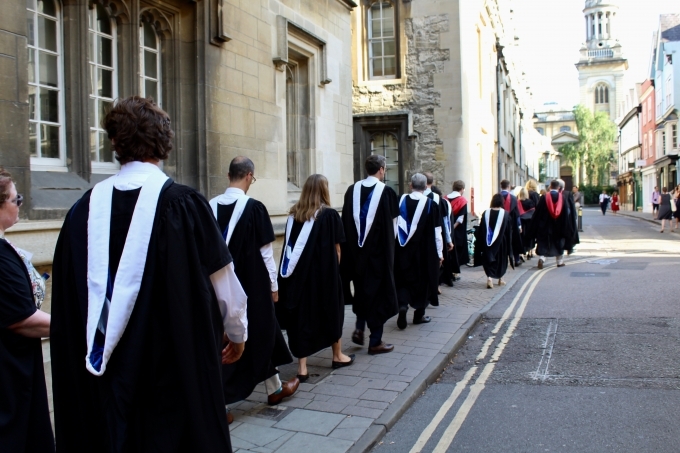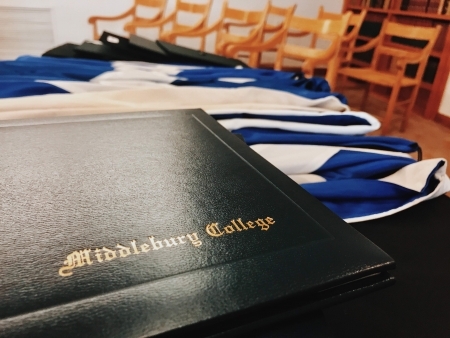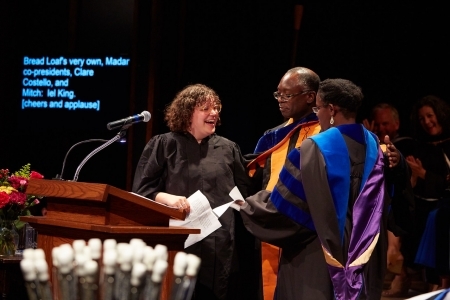For Your Consideration

As is the Bread Loaf custom, class presidents delivered Commencement speeches in Oxford, Santa Fe, and Vermont last summer. Here we excerpt some of their wise words.
Oxford, England
It is not to diminish the intellectual rigor of the Bread Loaf School of English to say that it—and we—are largely concerned with stories. Stories are essential. Essential to humanity is our ability to tell stories, our eagerness to learn them, our insistence on adapting them over and over and over again, and our courage in seeking out those we have not yet heard or told.
Here are some, offered as very, very short stories by a few of my fellow graduates:
Tim Crane’s Bread Loaf stories start with the questions he’s overheard here, in Vermont, and in Santa Fe over the years [including]: “Where do you live in real life?” Because there is this sense that these spires, those green mountains, that wild landscape, are on loan to us. We cannot claim those stories, but we will remember them, add them to our stories, where they will be part of our real life.
Dana Olsen described the Bread Loaf magic as “leaping exuberantly into the unknown,” and Stacy Rodgers says, “Under the broad leaves of Grove Quad and tucked into the cold brick corners of Deep Hall and jerking along upon the plush seating of a London-bound coach, I met with vitality, joy, kinship.” It’s not just kinship with our classmates, but with the staff who make sure we are cared for, and with our professors, tutors, or teachers, even or perhaps especially those who challenge our ideas of ourselves, who offer more than just praise or gentle criticism, but who ask us to be better, to go further, to risk. It is kinship that assures us that the exuberant leap was worth it, that we can leap again and again, and continue to seek out unknowns.
What a gift, what a privilege Bread Loaf is! I wish that more people in the world could have the privilege of a Bread Loaf education, but even more, I wish that more people in the world could have the privilege and agency to tell their own stories. And this, remarkably, is something over which we have some power. By sharing stories, writing stories, analyzing, arguing over, teaching stories, selecting new stories and, sometimes, discarding old ones, we share this gift, we use this privilege.
Sydney Gay offered up this six-word story: “I read. I wrote. I learned.”
I would add: “I loved.”
—Sarah Murphy MA ’18, Oxford class president
Santa Fe, New Mexico
Bread Loaf/Santa Fe has its own magic. When I got to campus this summer after having been away for two years, I got out of my car, inhaled, and felt a current of joy run through my body. This, on so many levels, was home. And after spending time with the six other seniors this summer, I know that I’m not alone in that feeling. We’re here graduating in Santa Fe because it embodies the soul of Bread Loaf for us, because Santa Fe took us all in, and there wasn’t any turning back.

Bread Loaf/Santa Fe offers so much more than the academic experience. Dawn Patrol, for example, is something that makes this campus so unique. Even if you aren’t doing Dawn Patrol each morning, it’s impossible not to feel the enchantment of this land. The air is so clean here, so crisp, and even though it’s thin and sometimes it feels like there really isn’t enough of it, you don’t need to work hard to feel healthy and whole breathing this Santa Fe air. There are also white-tailed bunnies darting across sidewalks; the smells of juniper, piñon, and sage; heat lightning shooting crooked through the sky; sunsets behind the bell tower; the outline of the mountains at dawn and dusk. All of these pieces of the landscape almost require us to slow down, take a deep breath, and remember how fortunate we are to be immersed in this place and this work.
The collaboration between faculty and students is another piece of the Bread Loaf/Santa Fe magic. We share leisurely meals together and, if we wish, can carry pieces of class into the dining hall. It reinforces the important idea that we are, together, a community of learners and scholars, not just of professors and students.
Now, we all study English literature, so we’re always looking for themes. If there’s one theme of this summer that is clear to us, it’s the importance of gratitude. Bread Loaf is an oasis. It’s a place where, for a few weeks, we get to enjoy the gift of spending time with both excellent literature and excellent people who share our love for that literature.
— Christopher Bolster MA ’18 and Kimberly Cooper MA ’18, New Mexico class copresidents
Ripton, Vermont
I am a teacher. I am subversive. I am part of an endangered species. You, by electing me as your class president, are also subversive. You just need a call to arms to make it official. So here it is:
- Everyone you meet should be better off for having met you. We must take learning, conflicting ideas, and possible collaborations into the world.
- Race is always a matter, but don’t be afraid of it. Don’t look away when you see a wrong. Witness it. Invite conversation with people who have different views.
- Take up space and interrogate the narrative, especially in your classrooms. It’s an uncomfortable place to be—it can get you reprimanded and ostracized. But giving voices to those not in our worlds only helps our students think for themselves.
- Take care of the things you value. That includes long-term giving to Bread Loaf to help those following behind us.
- Women: take up space and don’t apologize.

These last five years have been good for me—painful—but I am a better teacher and person for inhabiting a space outside my comfort zone. Now that you see, you can choose to look the other way, but you can never say you did not know.
As an endangered species, all we have is the ability to make up our own minds. Let’s own it and get to work.
—Stacey Mitchell King MA ’18, Vermont class copresident
Two summers ago, I signed up for Angela Brazil’s class Using Theater in the English Classroom. I expected a fun summer filled with nice activities to bring back to my classroom.
I will tell you now that it was not simply that—in fact, it is common to hear Bread Loafers say that Angela’s class changed their lives. For six weeks, she helped us to use our movement and our voices to more deeply understand texts… . Perhaps most importantly, we learned what kind of risk is involved in these performances. I often associate risk taking with jumping off high places or swimming near things with teeth, but it turns out that it is often a more subtle game. Risk taking can be sharing your true feelings about something important. Angela taught us that for vulnerability to happen, you must build community first.
In our daily lives, we are asked to be professionals—we are supposed to know answers. But at Bread Loaf, we are given a space to be risk takers, to stretch ourselves, to ask questions, to be vulnerable—and we are able to do so because we are never alone in doing it. At Bread Loaf, we participate in a “communion of yes.”
This communion is what makes us able to question more deeply in class, to share a poem with each other. Vulnerability becomes a kind of comfort zone, and we begin to feel more ourselves when taking risks. This communion is what makes us able to drop the performance of our daily lives and become our truest selves: open, vulnerable, and together.
— Clare Costello MA ’18, Vermont class copresident
